Crash, David Cronenberg’s dazzling, daring, disturbing adaptation of JG Ballard’s novel about car crashes and sex is one of the most infamous of all cinema cause celebres.
The film's premiere in Cannes in 1996 caused an extraordinary ballyhoo, with then Evening Standard critic Alexander Walker writing a review with the headline "a movie beyond the bounds of depravity" and jury president Francis Coppola declining to join his fellow jury members in awarding the film a special jury prize.
The festival showing was followed by attempts around the world, most notably in the UK and US, to have the film banned – often led by people who hadn’t even seen it.
It remained divisive for those who had. But what Coppola's colleagues may have found is a hugely confident work of experimental cinema, in which form and subject matter are in perfect harmony, the execution damn near perfect. And as this new 4K restoration reminds us, it is visually stunning. Whether one accepts the perverse psychopathology that Ballard and Cronenberg explore, history shows we’re guilty of a lot more twistedness than getting off on James Deans’ fatal car crash.
But it is a difficult watch, not because of anything particularly explicit, but because we’re not used to sex scenes dominating screen time in this way outside of pornography. Unlike pornography, however, the sex – and the cars – drive both plot and characterisation in Crash. There’s method to the madness.
 Transposing the action from London to Toronto, Cronenberg’s script opens with the author’s alter ego, film producer James Ballard (James Spader) and wife Catherine (Deborah Kara Unger), a couple whose marital routine is both highly risqué and stifled by ennui. As the film’s opening of three consecutive sex scenes illustrate, their way of connection is to each have casual sex with strangers, and report back during their own intercourse. “Did she come?” Catherine asks, as they fuck on the balcony of their high-rise apartment, overlooking the city’s teeming freeways. “We were interrupted,” he answers. “Poor darling. Maybe the next one.”
Transposing the action from London to Toronto, Cronenberg’s script opens with the author’s alter ego, film producer James Ballard (James Spader) and wife Catherine (Deborah Kara Unger), a couple whose marital routine is both highly risqué and stifled by ennui. As the film’s opening of three consecutive sex scenes illustrate, their way of connection is to each have casual sex with strangers, and report back during their own intercourse. “Did she come?” Catherine asks, as they fuck on the balcony of their high-rise apartment, overlooking the city’s teeming freeways. “We were interrupted,” he answers. “Poor darling. Maybe the next one.”
This routine is broken when Ballard is involved in a car crash, in which the male passenger of the other car dies. The man’s wife, doctor Helen Remington (Holly Hunter) survives and, like Ballard, is taken to the nearby airport hospital for surgery and convalescence. The pair meet in the corridors, where the mysterious Vaughn (Elias Koteas, pictured below with Spader) is sniffing around, quite literally when it comes to wounds, for info on their accident.
James and Helen meet again, back on their feet when searching out the wrecks of their cars in the police pound. He’s already replaced his car with the same, dull model and gives her a lift. Jarred by another close shave on the road, they christen it with sex in the airport car park.
Like James and Catherine, Helen is already an idiosyncratic figure; she will later reveal a litany of stray men she’s had sex with in cars. All three are ripe for Vaughn, a predatory outsider whose ‘project’ is to find the sexual arousal in car crashes – the more violent the better. 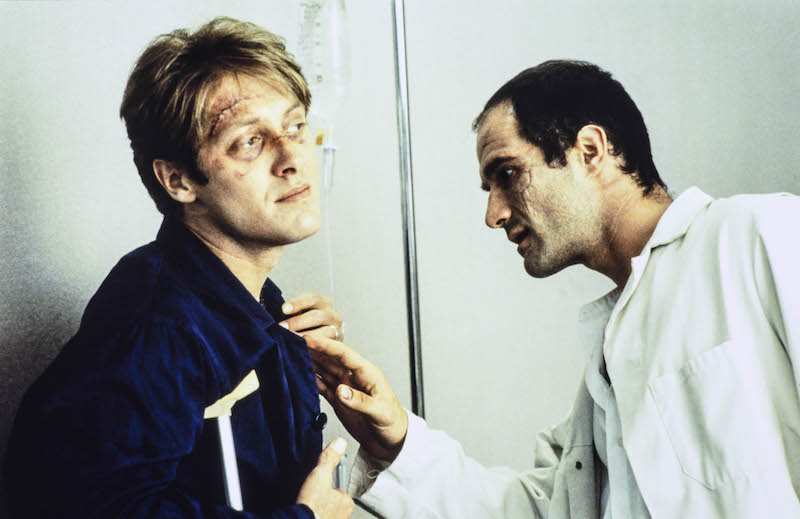 Vaughn’s own vehicle, which he lives in, is a black Lincoln Convertible (the car Kennedy was assassinated in), a monster that one character describes as “a bed on wheels”. When he’s not introducing celebrity car crash re-enactments, Vaughn is seeking out new accidents on the freeway, so that he can document the remains of flesh and metal, fetishize them, derive sexual energy from them.
Vaughn’s own vehicle, which he lives in, is a black Lincoln Convertible (the car Kennedy was assassinated in), a monster that one character describes as “a bed on wheels”. When he’s not introducing celebrity car crash re-enactments, Vaughn is seeking out new accidents on the freeway, so that he can document the remains of flesh and metal, fetishize them, derive sexual energy from them.
There’s a word for this, not used in the film, symphorophilia. Vaughn suggests that he’s interested in "a reshaping of the human body by modern technology". Though he will sarcastically retract that comment, his girlfriend Gabrielle (Rosanna Arquette, pictured below) has come through her own car accident with permanent, very conspicuous leg braces and stick, the look customised with leathers and fishnet tights that reveal a typically bulbous, Cronenbergian open wound that looks like it might gobble you up.
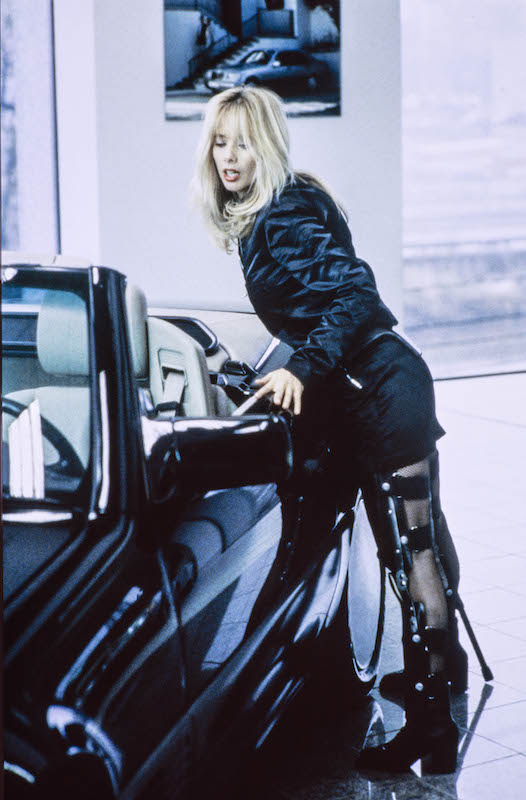 The interface between the human body and technology lies at the root of Cronenberg’s “body horror” films, Videodrome and The Fly among them. This is a different animal, though the director has found the intersection between his own interests and Ballard’s extrapolation of society’s umbilical connection to the automobile. From Crash’s opening credits – chrome lettering emerging into a deep blue screen, accompanied by the clanging reverb of harp and guitar on Howard Shore’s fabulous score – we’re entering into a world of metallic strangeness.
The interface between the human body and technology lies at the root of Cronenberg’s “body horror” films, Videodrome and The Fly among them. This is a different animal, though the director has found the intersection between his own interests and Ballard’s extrapolation of society’s umbilical connection to the automobile. From Crash’s opening credits – chrome lettering emerging into a deep blue screen, accompanied by the clanging reverb of harp and guitar on Howard Shore’s fabulous score – we’re entering into a world of metallic strangeness.
Amid the round robin of increasingly perverse sexual encounters, the most notable involves Ballard’s close acquaintance with Gabrielle’s wound, but the most shocking and revealing – and thrillingly executed – is the bruising encounter between Vaughn and Catherine as the Lincoln travels through a car wash, with James at the wheel. The filming and editing give the impression that Catherine is somehow being violated by the vehicle itself, a fitting inference given that it’s hard to disassociate the man from his machine.
The spare dialogue, with Spader and Unger talking in whispers, she seemingly narcotised, Peter Suschitzky’s atmospheric camerawork, the otherworldly score, all create a sense of cold dislocation from the world. The car chases and crashes, filmed in real time, without effect or zippy angles – immediate, brutal – disrupt that dislocation, as does Koteas’ febrile, frightening, almost bestial performance. It’s OTT, but works, giving the film a tension and propulsion that are part of the reason why it can’t be dismissed as mere glossy voyeurism – though in truth Cronenberg does tread right up to the edge.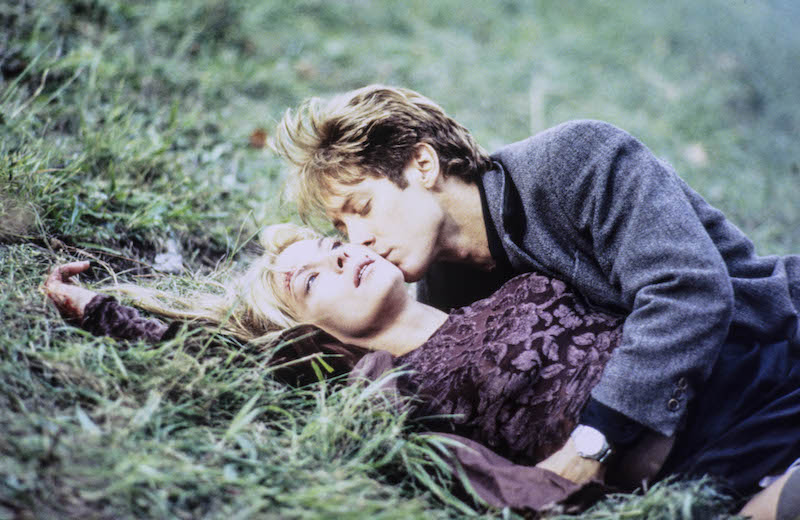 Not having seen the fllm since ’96, I was reminded how a first viewing of Crash really throws you. It’s impossible to know what to make of it, other than it’s intense, fascinating and surprisingly very funny. It’s certainly not a cautionary tale – there’s not an ounce of moralising in it; it’s perhaps a proposition, of how far people might go in trying to explore their sexuality when desensitised by so much of daily life, though it's not one that is necessarily taken too seriously. At one point in the film Ballard tells Vaughn: “It’s all very satisfying. I'm not entirely sure I understand why."
Not having seen the fllm since ’96, I was reminded how a first viewing of Crash really throws you. It’s impossible to know what to make of it, other than it’s intense, fascinating and surprisingly very funny. It’s certainly not a cautionary tale – there’s not an ounce of moralising in it; it’s perhaps a proposition, of how far people might go in trying to explore their sexuality when desensitised by so much of daily life, though it's not one that is necessarily taken too seriously. At one point in the film Ballard tells Vaughn: “It’s all very satisfying. I'm not entirely sure I understand why."
In one of the many excellent extras on this release, the onstage talk that Cronenberg and Ballard gave to the BFI in 1996, the director surprisingly describes the film as “an existentialist romance”. It's not impossible to see that, in Vaughn's project, Ballard and Catherine (Deborah Kara Unger, pictured above, with Spader) have found something they might genuinely share, a chance to reconnect. Though if that's the case, Vaughn is the marriage counsellor from hell.
There are also new interviews with regular collaborators Suschitzky, Shore, producer Jeremy Thomas and casting director Deirdre Bowen, archive interviews with the cast, a 1981 short film featuring Ballard himself, based on his original, short story version of the material, and a video essay charting the use of architecture and location throughout Cronenberg’s work, which serves as taster and very seductive prompt for a retrospective.

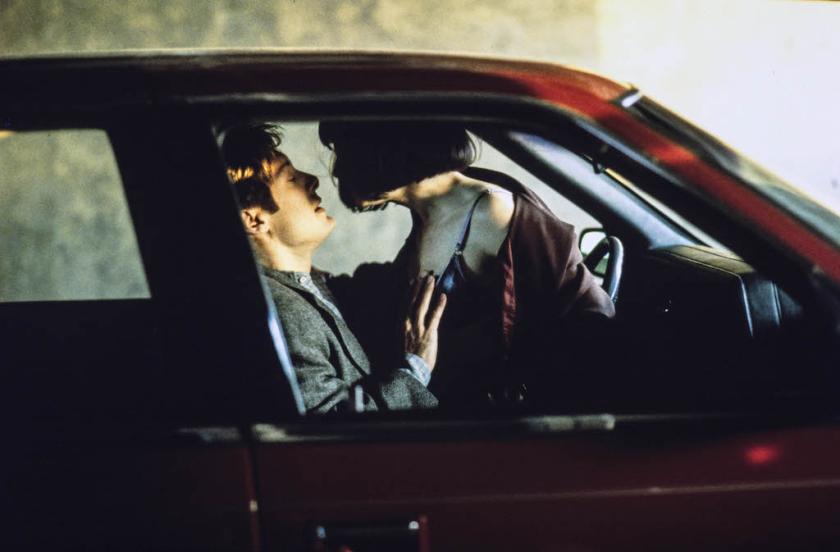









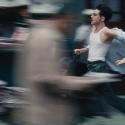



Add comment